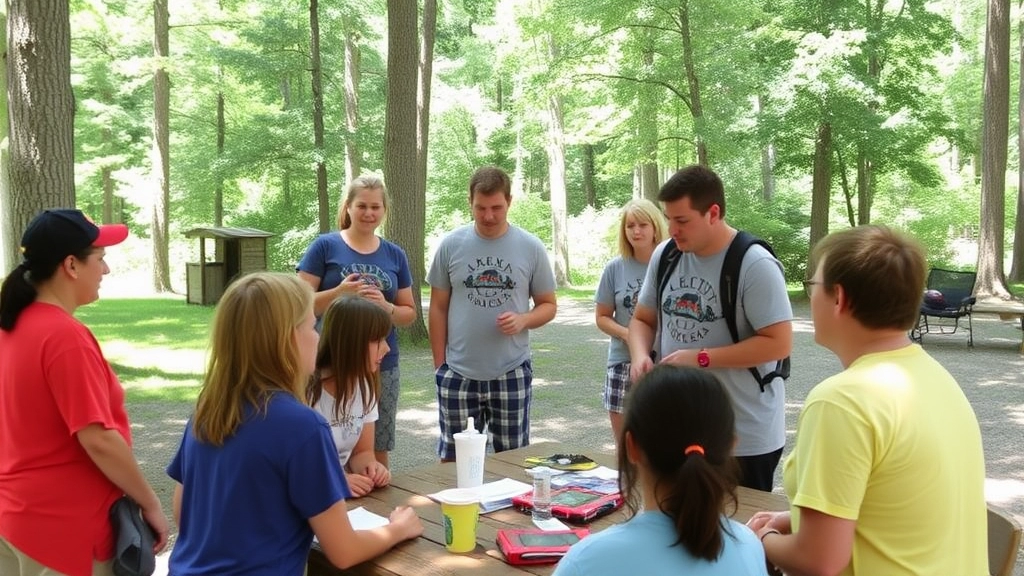Summer Camp Staff Training
When it comes to Summer Camp Staff Training, it’s crucial to equip your team with the essential skills they need to create a safe and engaging environment for campers. From health and safety protocols to effective communication techniques, a well-rounded training program ensures that staff are prepared for any situation. This guide will walk you through best practices and practical tools to make your staff training sessions both informative and interactive.
Building a Supportive Team Culture
Building a supportive team culture is the backbone of any successful summer camp. Through team-building exercises and role-playing scenarios, you can foster a sense of camaraderie and trust among your staff. We’ll explore key activities designed to boost staff engagement and outline strategies for leadership and decision-making, ensuring your team is ready to handle camper issues and emergencies with confidence.
Essential Skills for Camp Staff
Ever wondered what it really takes to be an ace camp staff member? Let’s cut to the chase. Being good at your job isn’t just about having fun and enjoying the great outdoors. It’s about mastering a set of essential skills that make you reliable, effective, and, most importantly, a positive influence on campers. So, what are these skills? Let’s dive in.
1. Communication Skills
First off, you need to be a top-notch communicator. Why? Because clear communication is the backbone of any successful camp experience. Here’s what you need to nail:
- Active Listening: Pay attention, show empathy, and respond thoughtfully.
- Clear Instructions: Be concise and direct. Kids and fellow staff need to understand you the first time.
- Conflict Resolution: Know how to mediate disputes calmly and fairly.
2. Leadership Abilities
Leadership isn’t just for the head honcho. Every camp staff member should be able to step up when needed. Here’s how you can flex those leadership muscles:
- Lead by Example: Your actions set the tone. Be the role model campers can look up to.
- Delegation: Know when to take charge and when to let others lead.
- Motivation: Keep the energy high and spirits up, even when things get tough.
3. Problem-Solving Skills
Camp life is unpredictable. You need to think on your feet and come up with solutions fast. Here’s what you need:
- Quick Thinking: Make decisions swiftly without losing your cool.
- Adaptability: Plans change. Be ready to pivot and adjust.
- Resourcefulness: Use what you have to solve problems creatively.
4. Safety Awareness
Safety is non-negotiable. Your ability to maintain a safe environment is crucial. Here’s how to stay on top of it:
- First Aid Knowledge: Be prepared for minor injuries and know when to call for help.
- Risk Assessment: Identify potential hazards before they become problems.
- Emergency Procedures: Know the camp’s protocols inside and out.
5. Teamwork
A camp runs smoothly when everyone works together. Being a team player is essential. Here’s what it looks like:
- Collaboration: Work well with others, share ideas, and support your teammates.
- Reliability: Be someone others can count on.
- Positive Attitude: Keep a can-do attitude, even during challenging times.
Real Talk: Why These Skills Matter
Imagine you’re in the middle of a nature hike, and a camper twists their ankle. If you’ve got strong communication and problem-solving skills, you’ll manage the situation smoothly, keeping everyone calm and safe. Or picture a scenario where two campers are having a disagreement. Your leadership and conflict resolution abilities will help you mediate effectively.
Building a Supportive Team Culture

Ever wondered why some camps just click, and others feel like a struggle?
It’s all about the team culture.
So, how do we build a supportive team culture at camp?
Let’s dive in.
Start with Trust
Trust is the foundation.
Without it, everything crumbles.
Here’s how to build it:
- Open Communication: Encourage everyone to speak up.
- Reliability: Do what you say you’ll do.
- Respect: Treat everyone like they matter, because they do.
Shared Goals
Everyone needs to be on the same page.
We’re all here for the campers, right?
Make sure the team knows the mission.
- Clear Objectives: What’s the big picture?
- Individual Roles: Who’s doing what?
- Team Meetings: Regular check-ins to keep everyone aligned.
Positive Environment
No one likes a negative Nancy.
Keep the vibes high.
- Celebrate Wins: Big or small, a win is a win.
- Support Each Other: Lift each other up, especially on tough days.
- Have Fun: Remember, it’s a camp! Enjoy it.
Real Talk
Let’s get real.
Sometimes, things go wrong.
How we handle it matters.
- Address Issues Quickly: Don’t let problems fester.
- Constructive Feedback: Help each other grow.
- Conflict Resolution: Teach and practice it.
Lead by Example
Leadership isn’t just a title.
It’s action.
- Be Present: Show up, every day.
- Stay Positive: Your energy is contagious.
- Be Approachable: Make it easy for your team to come to you.
Stories from the Field
I remember my first camp.
We had a rough start.
But then, we had a breakthrough.
We started sharing our stories, our struggles, and our wins.
We became a family.
And that’s what made the difference.
Key Activities for Staff Engagement
Alright, let’s talk about staff engagement. You know, it’s that secret sauce that turns a good camp into a great one. So, what’s the deal? How do we keep our staff pumped and ready to give their best? Here’s the lowdown.
Real Questions and Worries
Ever wondered why some camps have staff who are always buzzing with energy while others seem like they’re dragging their feet? Or maybe you’re worried about keeping your team motivated through the entire camp season? Trust me, you’re not alone. These are the questions that keep camp directors up at night.
Why Staff Engagement Matters
Look, if your staff isn’t engaged, your campers will feel it. Engaged staff lead to happy campers, and happy campers lead to a successful camp. It’s that simple. So, let’s break down how we can keep our team engaged and loving every minute of their work.
Icebreaker Activities
Start with icebreakers. These aren’t just for campers. They help staff get to know each other and build a sense of camaraderie. Here are some killer icebreakers:
- Two Truths and a Lie: Always a classic. It’s fun and gets everyone talking.
- Human Knot: A bit of a physical challenge, but it’s great for team building.
- Speed Dating: Quick rounds where staff share fun facts about themselves.
Team-Building Exercises
Next up, team-building exercises. These are crucial for fostering trust and cooperation. Think of them as the glue that holds your team together. Here are some must-try activities:
- Trust Falls: Old school but effective.
- Escape Rooms: These are fantastic for problem-solving and teamwork.
- Scavenger Hunts: Mix it up with a themed hunt around the camp.
Regular Check-Ins
Regular check-ins are a game-changer. It’s not just about tasks; it’s about well-being. Here’s how you can do it:
- Daily Huddles: Quick 10-minute meetings to touch base.
- One-on-Ones: Weekly or bi-weekly sessions to discuss any concerns or ideas.
- Anonymous Feedback: Use tools like Google Forms to get honest feedback.
Fun Competitions
Who doesn’t love a bit of friendly competition? It keeps things lively and gives everyone something to look forward to. Here’s what you can do:
- Camp Olympics: Set up different challenges and let the games begin.
- Talent Shows: Let your staff showcase their hidden talents.
- Trivia Nights: A fun way to test knowledge and have a few laughs.
Social Events
Don’t underestimate the power of social events. These are perfect for unwinding and building stronger bonds. Consider these ideas:
- Barbecues: Nothing beats a good BBQ night.
- Movie Nights: Pick a classic and enjoy.
- Theme Parties: Get creative with different themes each week.
Real Stories
Let me share a quick story. Last summer, we had a staff member who was quite reserved. Through regular check-ins and team-building activities, she gradually opened up. By the end of the season, she was leading activities and had built strong friendships. That’s the power of engagement.
Keep It Fresh
Remember, the key to keeping your staff engaged is variety. Mix things up and keep it fresh. Don’t let activities become routine. Keep them guessing and excited for what’s next.
Effective Communication Techniques During Training

Ever wondered why some training sessions just click, while others fall flat?
Let’s dive into effective communication techniques during training.
Why Communication Matters
First off, why is communication so crucial?
Think about it.
If your staff isn’t getting the message, how can they perform well?
Here’s what we’ll cover:
- Making your message stick
- Keeping everyone engaged
- Ensuring everyone leaves the room smarter
Make Your Message Stick
You want your staff to remember what you say, right?
Here’s how:
- Keep it simple: Don’t drown them in jargon. Speak plainly.
- Use stories: Share real-life examples. It makes the info relatable.
- Repeat key points: Repetition helps retention. Repeat the main ideas.
Keep Everyone Engaged
No one likes a boring training session.
Here’s how to keep it lively:
- Interactive sessions: Ask questions. Get them talking.
- Group activities: Break them into teams. Let them solve problems together.
- Use visuals: Slides, videos, props. Mix it up.
Ensure Everyone Leaves Smarter
You want them to walk out smarter than they walked in.
Here’s how:
- Check for understanding: Pause and ask if everything’s clear.
- Summarise often: Wrap up sections with quick summaries.
- Encourage questions: Make it safe to ask anything.
Real-Life Example
Remember that time when we had a training session on first aid?
We used real-life scenarios.
Everyone was hooked.
They left the room ready to handle emergencies.
Quick Tips Recap
- Keep it simple.
- Use stories.
- Repeat key points.
- Ask questions.
- Use visuals.
- Summarise often.
- Encourage questions.
Handling Camper Issues: Role-Playing Scenarios
Alright, let’s get real for a second. How many times have you thought, “What if I can’t handle a camper’s meltdown?” or “What if a camper gets into a fight?” These are legit worries, and guess what? You’re not alone. Handling camper issues can be a minefield, but role-playing scenarios can be your best friend here. Trust me, it’s like having a cheat sheet for real-life problems.
Why Role-Playing Scenarios?
Role-playing scenarios are your secret weapon. They give you a safe space to practice and mess up without any real consequences. Plus, they help you think on your feet. So, when a camper issue pops up, you’re not caught off guard. Let’s dive into how you can nail this.
Common Camper Issues to Role-Play
Conflict Resolution
- Scenario: Two campers are arguing over a game.
- Steps:
- Separate the campers.
- Listen to both sides.
- Mediate a compromise.
- Example: Imagine you’re in the middle of a heated argument over who gets to be the team captain. You step in, listen to both sides, and suggest a rotation system. Everyone’s happy, and the game goes on.
Homesickness
- Scenario: A camper is crying and wants to go home.
- Steps:
- Comfort the camper.
- Distract with activities.
- Encourage participation.
- Example: Picture a camper sobbing in the corner, missing home. You sit with them, share a story about your first camp experience, and invite them to join a fun activity. Before you know it, they’re smiling and engaged.
Bullying
- Scenario: A camper reports being bullied.
- Steps:
- Take the report seriously.
- Investigate quietly.
- Implement consequences.
- Example: A camper tells you they’re being bullied. You calmly gather information, talk to the involved parties, and set clear rules against bullying. The camper feels heard and safe.
How to Set Up Role-Playing Scenarios
- Gather Your Team: Get everyone together. The more, the merrier.
- Assign Roles: Pick who will be the camper, the staff, and any other roles needed.
- Act It Out: Go through the scenario step-by-step.
- Debrief: Discuss what went well and what could be improved.
Tips for Effective Role-Playing
- Keep It Real: Use real-life examples that you or your team have experienced.
- Stay In Character: Treat it like it’s the real deal.
- Be Honest: Give and take constructive feedback.
The Power of Role-Playing
Role-playing isn’t just a training exercise; it’s a confidence booster. It prepares you for the unexpected and makes you a pro at handling camper issues. So, next time you face a meltdown or a fight, you’ll be ready to tackle it head-on.
For more comprehensive tips on managing camper issues, check out our Top Summer Camp Tips for Parents and Kids. If you’re interested in creative ways to keep campers engaged, don’t miss our guide on Creative Summer Camp Theme Weeks.
Structuring a Comprehensive Training Agenda

Alright, let’s dive in.
How do you create a training agenda that actually works?
You know, one that doesn’t just tick boxes but really prepares your camp staff for anything.
Here’s the deal: a solid training agenda is like the backbone of your camp’s success.
It ensures everyone’s on the same page and ready to tackle whatever comes their way.
First things first, what should be on this agenda?
1. Start with the Basics
- Introduction and Orientation: Get everyone familiar with the camp’s vision, mission, and values.
- Camp Layout: A quick tour to know the ins and outs of the place.
- Roles and Responsibilities: Clear expectations from day one.
2. Essential Skills for Camp Staff
- First Aid Training: Non-negotiable.
- Conflict Resolution: How to handle disputes among campers.
- Activity Planning: Keeping kids engaged is an art.
3. Building a Supportive Team Culture
- Team-Building Exercises: Icebreakers, trust falls, you name it.
- Open Communication: Encourage sharing ideas and concerns.
4. Key Activities for Staff Engagement
- Interactive Workshops: Hands-on learning beats lectures any day.
- Role-Playing Scenarios: Practice makes perfect.
5. Effective Communication Techniques During Training
- Active Listening: More than just hearing words.
- Clear Instructions: Avoid misunderstandings.
6. Handling Camper Issues: Role-Playing Scenarios
- Real-Life Examples: What would you do if…?
- Debriefing: Discuss what went well and what could improve.
7. Addressing Health and Safety in Camp Settings
- Safety Drills: Fire, earthquake, you name it.
- Health Protocols: Keeping everyone healthy and safe.
8. Strategies for Leadership and Decision-Making
- Leadership Workshops: Building future leaders.
- Decision-Making Exercises: Quick thinking under pressure.
9. Incorporating Feedback and Performance Assessments
- Regular Check-Ins: Keep track of progress.
- Constructive Feedback: Help them grow.
10. Preparing Staff for Crisis Management
- Crisis Scenarios: What if the worst happens?
- Emergency Plans: Step-by-step guides.
Remember, a comprehensive training agenda is not just a list.
It’s a roadmap.
It guides your staff through every possible scenario, ensuring they’re ready to give campers the best experience.
Addressing Health and Safety in Camp Settings
Alright, let’s dive into one of the most critical aspects of running a camp: health and safety. If you’re like me, you’ve got a million questions racing through your mind. “What if a camper gets injured?” “How do we handle allergies?” “What’s the protocol for extreme weather?” Let’s tackle these concerns head-on and break it down.
Why Health and Safety Matter
First off, let’s get real. Health and safety aren’t just about ticking boxes; it’s about making sure everyone has a great time without any mishaps. Nobody wants to deal with a situation that could have been avoided with a bit of prep. So, let’s make sure we cover all bases.
Common Health Concerns and How to Handle Them
1. Injuries and First Aid:
- Cuts and Scrapes: Always have a well-stocked first aid kit. Clean the wound, apply antiseptic, and cover it with a bandage.
- Sprains and Strains: Ice packs and elevation are your best friends. Make sure to rest the injured area.
- Serious Injuries: Know the nearest medical facility and have a plan to get there fast.
2. Allergies and Medical Conditions:
- Allergy Action Plans: Collect information on camper allergies before camp starts. Have EpiPens and other necessary meds readily available.
- Medication Management: Keep a log of all medications campers need to take. Assign a staff member to manage this.
3. Hydration and Heat Exhaustion:
- Hydration Stations: Set up multiple water stations around the camp. Encourage frequent water breaks.
- Shade and Rest: Create shaded areas where campers can cool off. Schedule rest periods during peak sun hours.
Safety Protocols Everyone Should Know
1. Emergency Drills:
- Fire Drills: Conduct regular fire drills so everyone knows the evacuation routes.
- Severe Weather: Have a plan for storms, including designated safe areas.
2. Supervision:
- Buddy System: Implement a buddy system to ensure no one is alone.
- Headcounts: Regular headcounts are a must, especially during transitions between activities.
3. Equipment Safety:
- Inspection: Regularly inspect all equipment for wear and tear.
- Training: Ensure staff know how to use equipment safely and can teach campers the same.
Real-Life Example: Handling a Heatwave
Picture this: It’s the middle of summer, and a heatwave hits. Temps are soaring, and you’re worried about heat exhaustion. Here’s what we did at my camp last year:
- Increased Water Breaks: We doubled the number of water breaks.
- Moved Activities: Shifted outdoor activities to early morning or late afternoon.
- Cooling Stations: Set up misting stations and handed out cold towels.
No one got sick, and we all managed to stay cool and hydrated. Simple changes, big impact.
Creating a Health and Safety Plan
Now, let’s put it all together. Here’s a quick checklist:
- First Aid Kits: Fully stocked and accessible.
- Emergency Contacts: List of local emergency services and nearest hospital.
- Staff Training: Regular training sessions on first aid and emergency protocols.
- Camper Info: Collect medical info and emergency contacts for all campers.
Strategies for Leadership and Decision-Making

Ever wondered how to make the right call when everything’s on the line at camp?
Let’s dive into some game-changing strategies for leadership and decision-making.
Why Leadership Matters
Leadership isn’t just about being the boss.
It’s about guiding your team through the highs and lows.
It’s about making decisions that impact everyone, from staff to campers.
Core Leadership Skills
So, what skills do you need?
- Empathy: Understand your team’s feelings and perspectives.
- Decisiveness: Make quick, informed decisions.
- Communication: Keep everyone in the loop.
- Adaptability: Be ready to pivot when things go sideways.
Decision-Making Process
Making decisions can be tough.
But here’s a simple process to follow:
- Identify the Problem: What’s the real issue here?
- Gather Information: Get all the facts.
- Consider Options: Weigh the pros and cons.
- Make a Choice: Trust your gut and go for it.
- Evaluate: Look back and see how it went.
Real-Life Example
Imagine this:
A camper gets injured during an activity.
Panic sets in.
You need to act fast.
First, identify the problem: the camper’s injury.
Next, gather information: How severe is it? What caused it?
Consider your options: Do you need medical help? Can you handle it on-site?
Make a choice: Call for medical assistance if needed.
Finally, evaluate: Review the incident to prevent future issues.
Leading by Example
Leadership isn’t just about making decisions.
It’s also about setting an example.
- Be Punctual: Show up on time.
- Stay Positive: Keep morale high.
- Be Approachable: Let your team know they can come to you.
Engaging Your Team
Keep your team engaged with:
- Regular Check-ins: Weekly meetings to discuss progress and issues.
- Open Forums: Let staff voice their opinions.
- Team-Building Activities: Strengthen bonds and trust.
Handling Pressure
Pressure is part of the job.
Here’s how to handle it:
- Stay Calm: Keep your cool, no matter what.
- Prioritise: Focus on what’s urgent.
- Delegate: Trust your team to handle tasks.
Incorporating Feedback and Performance Assessments
Alright, let’s get real here. How do you ensure your camp staff are not just doing their jobs, but smashing it out of the park? Incorporating feedback and performance assessments is your golden ticket. But, how do you do it without making it feel like a corporate snooze fest?
Why Feedback and Performance Assessments Matter
Ever wondered why some camps run like a well-oiled machine while others feel like a chaotic mess? It boils down to feedback and performance assessments. These are not just corporate buzzwords; they are crucial for:
- Improving staff performance
- Boosting team morale
- Ensuring camper safety and satisfaction
Real Concerns: What’s on Your Mind?
You might be thinking:
- “How do I give feedback without sounding like a jerk?”
- “What if my staff don’t take it well?”
- “How often should I do performance assessments?”
Let’s dive into it.
Making Feedback Effective and Palatable
Giving feedback isn’t about nit-picking. It’s about helping your staff grow. Here’s how to do it right:
- Be Specific: General comments like “Good job” or “You need to improve” are useless. Instead, say, “I noticed you handled the camper’s meltdown really well by staying calm and using positive reinforcement.”
- Timely: Don’t wait for the end of the season. Give feedback as soon as possible.
- Balanced: Mix positive feedback with areas for improvement. No one likes a constant critic.
Performance Assessments: Not Just a Checklist
Performance assessments are more than ticking boxes. They should be a comprehensive review of your staff’s skills, attitudes, and contributions. Here’s a quick guide:
- Set Clear Criteria: What are you assessing? Leadership skills? Teamwork? Problem-solving?
- Regular Check-ins: Don’t wait for the end of the season. Monthly or bi-weekly reviews work wonders.
- Self-Assessments: Encourage staff to evaluate themselves. It makes them more self-aware and engaged.
Tools and Techniques
To keep it fresh and engaging, use a mix of methods:
- One-on-One Meetings: Personal, direct, and effective.
- Peer Reviews: Staff can learn a lot from each other.
- Surveys and Forms: Quick and easy for everyone.
Real-Life Example
I remember this one time, we had a staff member who was fantastic with the kids but struggled with time management. Instead of a generic “You need to manage your time better,” we sat down and broke it down. We identified specific tasks that were taking too long and brainstormed solutions together. By the end of the season, not only had their time management improved, but they also felt more confident and appreciated.
For more tips on managing summer camps effectively, check out our Ultimate Summer Camp Planning Checklist and learn how to create a fun atmosphere with our Summer Camp Decoration Ideas.
Preparing Staff for Crisis Management
Ever thought, “What if something goes wrong at camp?”
You’re not alone.
Crisis management is a big deal, and we need to be ready.
Why Crisis Management Matters
We’re talking about real stuff hereâinjuries, lost campers, even natural disasters.
It’s not just about having a plan; it’s about knowing it like the back of your hand.
Key Elements of Crisis Management
1. Clear Protocols
- Emergency Contacts: Everyone should know who to call.
- Evacuation Plans: Clear routes and meeting points.
- First Aid: Basic knowledge is a must.
2. Regular Drills
- Fire Drills: Practise makes perfect.
- Missing Camper Drills: Time is of the essence.
- Medical Emergencies: Quick action can save lives.
Real-Life Scenarios
Think about it like this:
Imagine a camper goes missing during a hike.
What’s the first step?
- Immediate Headcount: Confirm the missing.
- Notify Authorities: Time to get the pros involved.
- Search Teams: Divide and conquer.
Building Confidence
We want our staff to feel confident, not scared.
Role-Playing Scenarios are gold.
- Simulate Real Situations: The more realistic, the better.
- Debrief After: What went well? What needs work?
Communication is Key
In a crisis, communication can make or break the situation.
- Walkie-Talkies: Old school but effective.
- Emergency Signals: Whistles, hornsâwhatever works.
- Chain of Command: Everyone should know who’s in charge.
Health and Safety First
Remember, it’s not just about reacting.
Prevention is crucial.
- Regular Inspections: Check equipment, facilities, and routes.
- Health Checks: Know your campers’ medical needs.
- Hydration Stations: Dehydration can lead to bigger issues.
Final Thoughts
Preparing for a crisis isn’t just a box to tick.
It’s about being ready when it counts.
So, let’s get our staff prepped and confident.
Because when a crisis hits, we don’t want to be caught off guard.
We want to be ready to act.
And act fast.
That’s how we keep everyone safe.
For more tips on ensuring safety, check out our essential summer camp medical forms guide. Additionally, understanding the benefits and costs of summer camp insurance can further enhance your preparedness.
FAQs on Summer Camp Staff Training
What are the key components of building a supportive team culture at camp?
Building a supportive team culture involves several key components:
- Trust: Encourage open communication, reliability, and respect among team members.
- Shared Goals: Ensure everyone understands the mission and their individual roles.
- Positive Environment: Celebrate wins, support each other, and have fun.
- Real Talk: Address issues quickly, provide constructive feedback, and practice conflict resolution.
- Lead by Example: Be present, stay positive, and be approachable.
Why is effective communication crucial during training sessions?
Effective communication is crucial because it ensures that staff understand the training material, stay engaged, and leave the session with a clear understanding of their responsibilities. Without effective communication, the training may not be as impactful.
How can you make your training message stick with the staff?
To make your message stick:
- Keep it simple: Avoid jargon and speak plainly.
- Use stories: Share real-life examples to make the information relatable.
- Repeat key points: Repetition helps with retention.
What strategies can keep staff engaged during training sessions?
To keep staff engaged:
- Interactive sessions: Ask questions and encourage discussions.
- Group activities: Break staff into teams for problem-solving activities.
- Use visuals: Incorporate slides, videos, and props.
What should be included in a comprehensive training agenda?
A comprehensive training agenda should cover:
- Introduction and Orientation: Familiarize staff with the camp’s vision, mission, and values.
- Essential Skills: Include first aid training, conflict resolution, and activity planning.
- Team Culture: Incorporate team-building exercises and open communication.
- Staff Engagement: Use interactive workshops and role-playing scenarios.
- Effective Communication: Teach active listening and clear instructions.
- Camper Issues: Practice handling real-life scenarios.
- Health and Safety: Conduct safety drills and teach health protocols.
- Leadership and Decision-Making: Include leadership workshops and decision-making exercises.
- Feedback and Assessments: Regular check-ins and constructive feedback sessions.
- Crisis Management: Prepare staff with crisis scenarios and emergency plans.
How can camp leaders improve their decision-making skills?
To improve decision-making skills, follow these steps:
- Identify the Problem: Understand the core issue.
- Gather Information: Collect all relevant facts.
- Consider Options: Weigh the pros and cons of each option.
- Make a Choice: Trust your judgment and decide.
- Evaluate: Review the outcome to learn and improve.
What are some essential leadership skills for camp staff?
Essential leadership skills include:
- Empathy: Understand your team’s feelings and perspectives.
- Decisiveness: Make quick, informed decisions.
- Communication: Keep everyone informed and engaged.
- Adaptability: Be ready to pivot when necessary.
How can camp leaders handle pressure effectively?
To handle pressure effectively:
- Stay Calm: Maintain your composure.
- Prioritise: Focus on urgent tasks first.
- Delegate: Trust your team to handle specific tasks.
References
-
How To Build A Supportive Team Culture
-
What Great Managers Do to Engage Employees
-
Effective Communication Techniques

